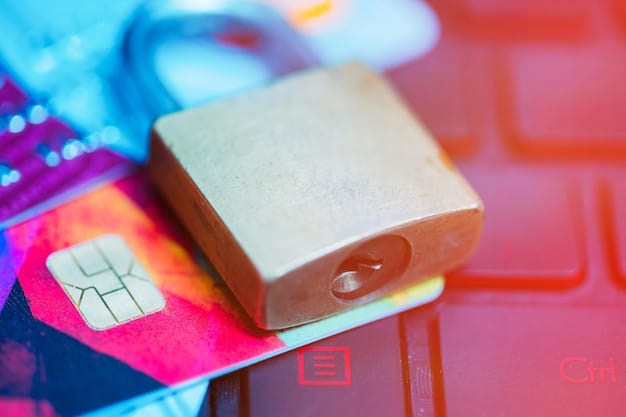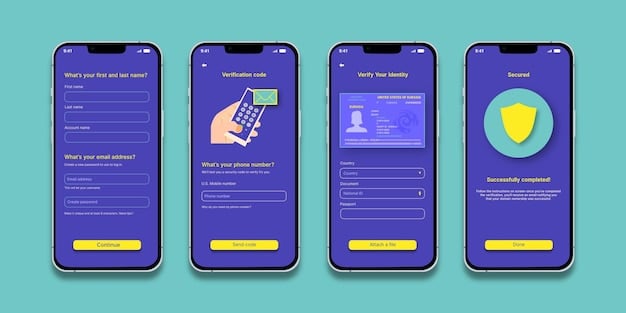Altcoin Wallets: Secure Storage Solutions & Accessibility Guide

Altcoin wallets are essential tools for managing and securing your digital assets, offering various features for accessibility and protection against potential threats.
Navigating the world of altcoins requires a solid understanding of how to store and manage these digital assets securely. Choosing the right altcoin wallets: choosing the right storage solution for security and accessibility is paramount to protecting your investments and ensuring convenient access when you need it.
Understanding Altcoin Wallets
Altcoin wallets are digital tools that allow you to store, manage, and transact with cryptocurrencies other than Bitcoin. These wallets come in various forms, each with its unique set of features, security measures, and levels of accessibility. Understanding the different types of wallets is crucial for making an informed decision.
Types of Altcoin Wallets
There are several types of altcoin wallets available, each catering to different user needs and risk tolerance. Let’s explore some of the most common options:
- Hardware Wallets: Physical devices that store your private keys offline, providing a high level of security against hacking and malware.
- Software Wallets: Applications installed on your computer or mobile device, offering convenient access to your altcoins but potentially being more vulnerable to security threats.
- Web Wallets: Online platforms that allow you to access your altcoins from any device with an internet connection, trading security for convenience.
- Paper Wallets: Printed documents containing your private and public keys, providing a simple and offline storage solution that requires careful handling.
Choosing the right type of wallet depends on your specific needs, including the amount of altcoins you hold, how frequently you plan to transact, and your overall risk tolerance. Each type offers a different balance between security, accessibility, and ease of use.

Furthermore, consider the specific altcoins you intend to store, as not all wallets support every cryptocurrency. Ensure that the wallet you choose is compatible with the altcoins you plan to hold to avoid any compatibility issues.
In conclusion, understanding the variety of altcoin wallets available is the first step in securing your digital assets. Each type offers different advantages and disadvantages, so consider your priorities carefully.
Security Features to Look For
Security is a critical aspect of any altcoin wallet. Choosing a wallet with robust security features will protect your digital assets from theft and unauthorized access. Understanding these features can help you make a well-informed decision.
Key Security Measures
When evaluating altcoin wallets, look for the following security features:
- Encryption: Ensures that your private keys and transaction data are protected from unauthorized access.
- Two-Factor Authentication (2FA): Adds an extra layer of security by requiring a second verification method, such as a code from your mobile device.
- Multi-Signature (Multi-Sig): Requires multiple approvals to authorize a transaction, preventing a single point of failure.
- Cold Storage: Keeps your altcoins offline, away from potential hacking attempts.
Implementing these security measures can significantly reduce the risk of losing your altcoins. Always verify that the wallet you choose has these essential features.
Another important consideration is the wallet provider’s reputation. Look for wallets from reputable companies with a track record of security and reliability. Read reviews and conduct thorough research before entrusting your altcoins to a particular wallet.
In addition to the technical security features, practice good security habits. Use strong, unique passwords, and never share your private keys with anyone. By combining robust security features with responsible user behavior, you can significantly enhance the safety of your altcoins.

Balancing Accessibility and Security
While security is paramount, accessibility is also an important factor to consider when choosing an altcoin wallet. The ideal wallet should provide a balance between robust security measures and convenient access to your digital assets.
Finding the Right Balance
Here are a few tips to help you find the right balance between accessibility and security:
- Consider Your Trading Frequency: If you trade frequently, a software or web wallet might be more convenient. If you hold altcoins for the long term, a hardware or paper wallet may be more suitable.
- Weigh the Risks: Understand the security risks associated with each type of wallet and choose one that aligns with your risk tolerance.
- Use Multiple Wallets: Consider using different wallets for different purposes. For example, use a hardware wallet for long-term storage and a software wallet for everyday transactions.
Balancing accessibility and security is a personal decision that depends on your individual circumstances and preferences. Taking the time to assess your needs and weigh the options will help you make the right choice.
Mobile Wallets: Convenience at Your Fingertips
Mobile wallets offer the convenience of managing your altcoins directly from your smartphone. These wallets are ideal for users who need to access their digital assets on the go, but it’s important to be aware of the security considerations.
Advantages of Mobile Wallets
Mobile wallets provide several benefits, including:
- Accessibility: Access your altcoins from anywhere with an internet connection.
- Ease of Use: User-friendly interfaces make it easy to send, receive, and manage your altcoins.
- Integration with DApps: Many mobile wallets support decentralized applications (DApps), allowing you to interact with blockchain-based services directly from your phone.
However, mobile wallets are generally less secure than hardware wallets. To mitigate the risks, choose a mobile wallet with robust security features, such as encryption and two-factor authentication. Keep your phone secure by using a strong password and avoiding public Wi-Fi networks.
Additionally, be cautious of phishing scams and malicious apps. Only download wallets from trusted sources, such as the official app store or the wallet provider’s website. Regularly update your wallet app to ensure you have the latest security patches.
In conclusion, mobile wallets offer unparalleled convenience for managing your altcoins. By taking the necessary precautions, you can enjoy the benefits of mobile access without compromising security.
Hardware Wallets: The Gold Standard for Security
Hardware wallets are considered the gold standard for securing altcoins. These physical devices store your private keys offline, providing a high level of protection against hacking and malware. If you hold a significant amount of altcoins, investing in a hardware wallet is highly recommended.
Benefits of Hardware Wallets
Hardware wallets offer several key advantages:
- Offline Storage: Your private keys are stored offline, making them inaccessible to hackers.
- Tamper-Proof Design: Hardware wallets are designed to be tamper-resistant, protecting against physical attacks.
- Support for Multiple Altcoins: Many hardware wallets support a wide range of cryptocurrencies, allowing you to manage your entire portfolio in one place.
However, hardware wallets can be more expensive and less convenient than software wallets. You need to physically connect the device to your computer to access your altcoins, which can be cumbersome for frequent traders.
When using a hardware wallet, follow the manufacturer’s instructions carefully. Keep your recovery seed in a safe place, as this is the only way to restore your wallet if you lose or damage the device. Never share your recovery seed with anyone.
Overall, hardware wallets provide the highest level of security for your altcoins. While they may require a bit more effort to use, the peace of mind they offer is well worth the investment.
Backup and Recovery: Protecting Against Loss
Regardless of the type of altcoin wallet you choose, it’s essential to have a backup and recovery plan in place. Losing access to your wallet can result in the permanent loss of your digital assets. Taking the time to create a backup and test the recovery process can save you from potential disaster.
Creating a Backup
Here are a few tips for backing up your altcoin wallet:
- Write Down Your Recovery Seed: Most wallets provide a recovery seed, a list of words that can be used to restore your wallet. Write down the seed and store it in a secure location.
- Create a Digital Backup: Some wallets allow you to create a digital backup of your wallet file. Store this backup on a secure external drive or in a password-protected cloud storage account.
- Test Your Recovery Process: Periodically test your recovery process to ensure that you can successfully restore your wallet from your backup.
It is crucial to store your backups in multiple secure locations. Consider using a combination of physical and digital backups to protect against different types of threats.
Conclusion
Choosing the right altcoin wallets: choosing the right storage solution for security and accessibility requires careful consideration of your individual needs and risk tolerance. By understanding the different types of wallets and their respective security features, you can make an informed decision that protects your digital assets while providing convenient access when you need it.
| Key Point | Brief Description |
|---|---|
| 🔒 Security Features | Encryption, 2FA, and multi-sig enhance wallet security. |
| 📱 Mobile Wallets | Convenient access but prioritize security measures. |
| 🛡️ Hardware Wallets | Offline storage ensures the highest level of security. |
| 💾 Backup & Recovery | Essential for preventing permanent loss of assets. |
Frequently Asked Questions
An altcoin wallet is a digital tool used to store, manage, and transact with cryptocurrencies other than Bitcoin. These wallets come in various forms, including hardware, software, and web-based options.
Hardware wallets store private keys offline, protecting them from online threats like hacking and malware. They are designed to be tamper-resistant, providing an extra layer of security.
Mobile wallets offer convenience and ease of use, allowing you to access your altcoins from anywhere with an internet connection. They are ideal for everyday transactions and can integrate with DApps.
Backup and recovery ensures that you can regain access to your altcoins if your wallet is lost, damaged, or compromised. Creating a secure backup is crucial for preventing permanent loss of assets.
Important security features include encryption, two-factor authentication (2FA), and multi-signature (multi-sig). These features protect your private keys and transaction data from unauthorized access.
Conclusion
In conclusion, selecting the appropriate altcoin wallet involves balancing security, accessibility, and personal needs. Prioritizing robust security measures and understanding the risks associated with each type of wallet is essential for protecting your digital assets.





